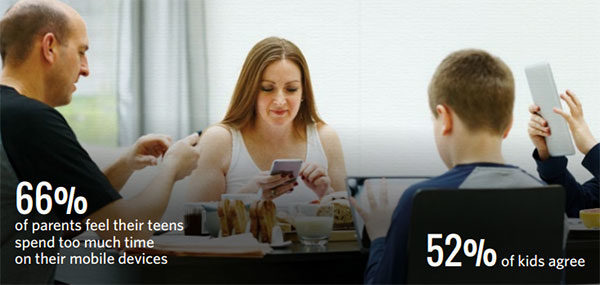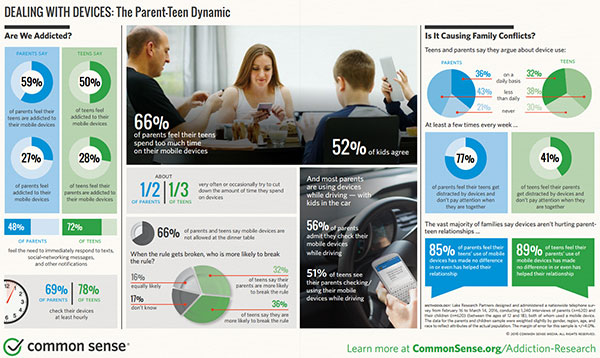
If you have a teenager, you most likely argue about screen time and Internet use. As the Internet has become a significant part of our lives, it has transformed the way we access information. For teenagers who have been raised with access to the Internet, they cannot imagine the world without it. Teenagers, as well as adults, have a difficult time without access to the Internet. A poll conducted by Common Sense Media found 50% of teenagers feel they have an addiction to their mobile devices, along with 27% of the parents.
Addiction Runs Both Ways
In this poll, which included 1,200 teenagers and their parents, 59% of parents said their teens are addicted to their mobile devices, with 50% of the teens themselves feeling they are addicted. For me, this is surprising that the number of teenagers who admit to being addicted is this high. In my practice, a majority of the teenagers I see agree they may have a problem with the Internet, but often do not see it as an addiction. The parents see the addiction and bring in their child for treatment.
This poll is interesting in that they also asked questions about the parent’s Internet use. 27% of parents feel they feel addicted to their mobile devices, with 28% of teenagers feeling their parents are addicted. Both teenagers and parents feel roughly 1/3rd of parents are addicted to their mobile devices. According to this poll, 1/2 of teenagers are Internet Addicts, with almost 1/3rd of the parents. As a specialist in treating Internet Addiction, this is not surprising.
So, how do parents and teenagers respond to messages and status updates? Do they feel they need to respond immediately, or can they wait? 48% of parents and 72% said they feel the need to respond immediately. Therapists and researchers are noticing a type of anxiety appearing if people do not respond to notifications immediately. Just as I write this passage, my phone is blinking at me, notifying me of a message. Do I stop writing to check it, or can I ignore it? I find myself sometimes feeling anxious when I receive a notification, and I imagine most do as well.
Managing Time Online
The amount of time parents and teenagers are spending online continues to be a concern. 66% of parents feel their teens spend too much time on their mobile devices, with 52% of kids agreeing. About 1/2 of parents try to cut down on their screen time while only 1/3rd of teenagers try to cut down on their Internet usage. The main problem is boredom, as most activities these days are electronic. If you want to read a book, you download an ebook. If you want to talk to friends, you text or post to social media. If you want to listen to music, you do so with your smartphone. Most teenagers have nothing to do if they are not online and do not know what to do with idle time.
What’s worse, the parents themselves are often to blame, as they cannot control their usage. 56% of parents admitted to checking their mobile devices while driving. To be honest, I imagine everyone has done it at some point. What message does this send to our kids, if we the parents are just as guilty? 51% of teens have seen their parents use their phones while driving, reinforcing this behavior when they become drivers.
Mobile Devices = Conflict
No teenager likes to be told no. No adult likes to be told no. More and more conflicts are arising over the use of mobile devices. 36% of parents and 32% of teens say they argue about device usage on a daily basis. 43% of parents and 38% of teenagers argue about device usage less than daily. All total, this means that around 80% of parents and 70% of teenagers admit to arguing about their devices on somewhat regular basis.
The more conflict over usage, the more hidden the behavior will become. Many of the teenagers I treat for Internet Addiction often stay up most of the night to access the Internet by sneaking phones to their rooms. Most would rather spend time online than sleeping. Most have been told numerous times by their parents to stop using their phones, with most not wanting to listen. Parents often lose their temper and begin to yell and scream resulting in conflicts that never seem to end.
Multitasking and the Lack of Focus
More than 3/4ths of parents reported their teens being distracted by devices when interacting with them. 41% of teens felt their parents become distracted by mobile devices when taking to them. Most teens and adults these days feel the need to multitask their time. As there never seems to be enough time, parents have always had to juggle time. Now, with the Internet, we can do multiple things at once, from listening to music and watching TV to doing work and streaming a live broadcast. As our brains are being filled with continuous information, we are losing the ability to focus.
The problem with multitasking is it is not productive. If we always being distracted by outside stimuli, we will not be able to focus all our attention on a task. Try to read a book and hold a conversation. Can you focus on the passage while listening to the conversation to the point you could discuss both a day later? You would most likely remember some of the content, but would not remember most of it. Our brains are not designed to multitask for long periods. The problem with teenagers is they are learning lifelong habits, which may hurt them once beginning a career.
The Irony of Relationships
From the results of this poll, you would most likely conclude that the Internet and media devices are ruining our teenagers, resulting in conflicts and damaged relationships. According to the poll, you would be wrong. 85% of parents and 89% of teenagers feel usage of mobile devices has not affected or harmed their relationships with each other. I find this difficult to understand, as it does not make sense. If parents are reporting they have conflicts with their teenagers, annoyed by their screen time and lack of focus, then how can they not think this is damaging to their relationship?
There is damage to relationships, mostly with the lack of real communication. Most communication now resembles “status updates” with small, 1-2 sentence soundbites. Real, in-depth conversations are more difficult to find. One of the biggest problems with social media is the lack of real, meaningful conversations in real time.
In Conclusion
This poll, while interesting, is not as complete as I would like. They did not list the exact questions used, and where the 1,200 teens and parents came from. While a poll is not the same as a scientific study, this information would have made it easier to understand the results. It is a useful poll in that it shows how much the Internet and mobile devices influence our culture.
Photo Credit: Common Sense Media
Pinterest Pins Relating to Internet Addiction:
- Internet Addiction News Weekly 02-28-24 - February 28, 2024
- Autism News Weekly 02-27-24 - February 27, 2024
- Autism News Weekly 01-22-2024 - January 24, 2024









